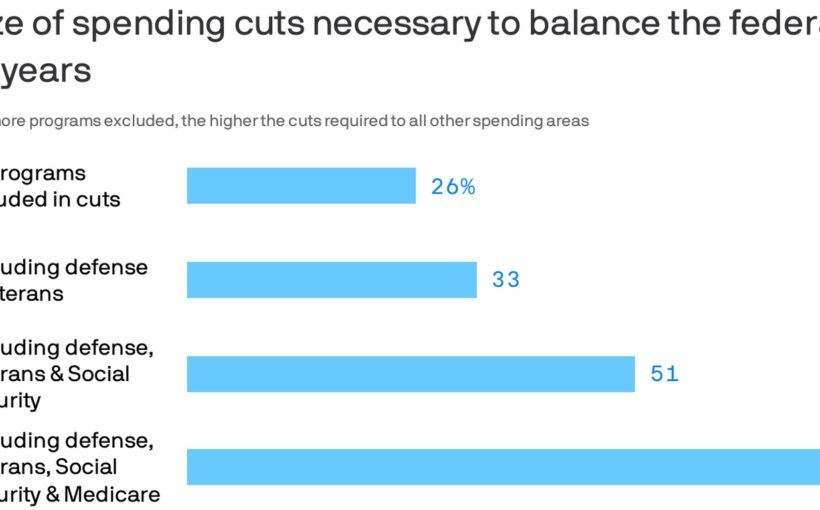Negotiations to raise the country's debt ceiling will likely put Republicans in a vise, torn among competing conservative pressures, the inevitable need to work with Democrats and the realities of basic budgetary math.
The big picture: Fiscal conservatives want to balance the federal budget. Former President Trump has warned his party to leave Medicare and Social Security untouched. It’s basically impossible to do both — and every way House Republicans could try to square that circle comes with political risk.
Driving the news: House Republicans have said they’ll refuse to raise the debt ceiling unless it’s accompanied by reductions in federal spending. But the party appears to be deeply divided as to what programs should be on the chopping block.
- Former President Trump warned against Medicare or Social Security cuts, urging Republicans to instead “cut waste, fraud and abuse everywhere that we can find it and there is plenty of it.”
- “But do not cut the benefits our seniors worked for and paid for their entire lives. Save Social Security, don’t destroy it,” he said in a video message posted to Truth Social.
Reality check: If you take off the table cuts to Medicare, Social Security, veterans and defense spending, and if you’re also not going to raise taxes to bring in more revenue, you’d need to cut about 85% of the rest of the budget in order to make it balance, according to a recent analysis by the Committee for a Responsible Federal Budget.
- “The numbers can’t work,” said Chris Campbell, a former Treasury official and GOP Finance Committee aide.
- That sets up a scenario in which either moderates or conservatives will have to cave in order to pass anything just through the House — never mind getting it through the Democrat-controlled Senate and White House.
State of play: Conservatives have said they secured a commitment from House Speaker Kevin McCarthyto create a budget that balances over the next decade, an exercise that would likely precede a vote on the debt limit.
- McCarthy reportedly agreed to freeze discretionary spending at 2022 levels, which has already rankled some GOP members who worry that would effectively mean less Pentagon funding.
- Some conservatives have said defense cuts weren't part of the deal. Republicans could theoretically get to 2022 spending levels just through non-defense spending cuts.
- The looming question is which cuts included in a budget would then be included in House Republicans' debt limit demands.
“This is shaping up to be a tough vote to balance in 10 years,” said a former House GOP leadership aide. “Where are the cuts going to be? Is it going to be on defense, entitlements or both? Both could cause problems.”
The intrigue: The House could always fake it. Budget resolutions are just frameworks; they don't become law. So the House GOP could pass a non-binding budget that includes steep cuts, then pursue only modest reductions when it’s time to actually set federal spending levels and negotiate over the debt ceiling.
- But some hardliners will push for the biggest cuts to be real.
- Flashback: Former Rep. Paul Ryan's 2012 plan to partially privatize Medicare only ever existed in a non-binding budget resolution — you don't have to actually make the cuts in order to open yourself up to a barrage of attack ads.
“You’ve got to protect Medicare and Social Security. And the path the Democrats are going, they are going to go bankrupt,” McCarthy recently told reporters, per the Washington Post.
- “Let’s sit down and find a place that we can protect Medicare and Social Security for the future generations, let’s put our house in order on how we’re going to spend, and let’s make the investments we need to make America stronger.”
What they’re saying: Most ultra-conservative members represent safe congressional districts, giving them little incentive to compromise. More moderate members in swing districts will likely want to take fewer political risks.
- “For those committed conservatives, they have a little more wiggle room than the more moderate members of…the Republican party, where the voters tend to be a little less forgiving on some positions that can be seen as — and would be characterized by Democrats, I’m sure — as extreme,” Campbell said.
Source: Read Full Article


